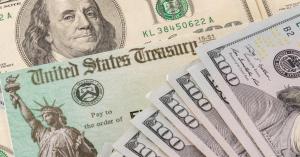There are multiple coronavirus relief bill options on the table right now, but many are wondering why the new proposals do not include stimulus checks. Currently, a $900 billion bipartisan bill is looming, though it features funds for nearly everything except direct payments to Americans. There is also Senate Majority Leader Mitch McConnell‘s slim bill, which provides funding in some areas, but also does not provide stimulus money for U.S. citizens.
As for why neither of these propositions provides for direct stimulus options, there are essentially two different answers. With the $900 billion bipartisan bill, the lawmakers behind it do not expect it to be the last stimulus bill, just the next. Democrat Sen. Mark Warner of Virginia has been a supporter of the proposal, and he calls it an “interim package.” Warner indicates that the purpose of the bill is to fund crucial programs that are about to end come the first of the year, and that a more comprehensive package could be worked out once presient-elect Joe Biden takes office. “If there’s one thing I’m hearing uniformly it’s: ‘Congress, do not leave town for the holidays leaving the country and the economy adrift with all these initial CARES [Act] programs running out,’” Warner said during an appearance on CNBC’s Squawk Box.
Videos by PopCulture.com
When it comes to McConnell’s slim proposal, no direct payments seems to boil down to McConnell not seeing value in sending stimulus payments to Americans. The reason for this may be due to the Kentucky Senator, along with many of his GOP peers, being worried that a high price tag on a stimulus bill could be detrimental to the national debt. Previously, Vox reported on this being that the reason Republicans have been taking so long to approve another payment.
The outlet quoted Sen. Ben Sasse, a Republican from Nebraska, as his basis for slamming Democrats and the Trump administration for wanting more direct payements. “The White House is trying to solve bad polling by agreeing to indefensibly bad debt,” he said. “This proposal is not targeted to fix precise problems — it’s about Democrats and Trumpers competing to outspend each other.”
Notably, Federal Reserve Chair Jerome Powell previously stated that national debt concerns are valid, but that “this is not the time to act on those concerns.” Neil Newhouse, a Republican pollster, spoke with Vox about the GOP’s worry over the national debt, and offered his professional perspective on the matter. “The concerns about adding to the deficit are far outweighed by the health concerns and economic concerns of Americans due to coronavirus,” he said. “The challenge for Republican candidates seeking reelection is not the Republican base; it’s independents, it’s moderates, it’s swing voters and the furthest thing from their minds is running up the deficit.”



